How AI makes a secret revolution in medicine
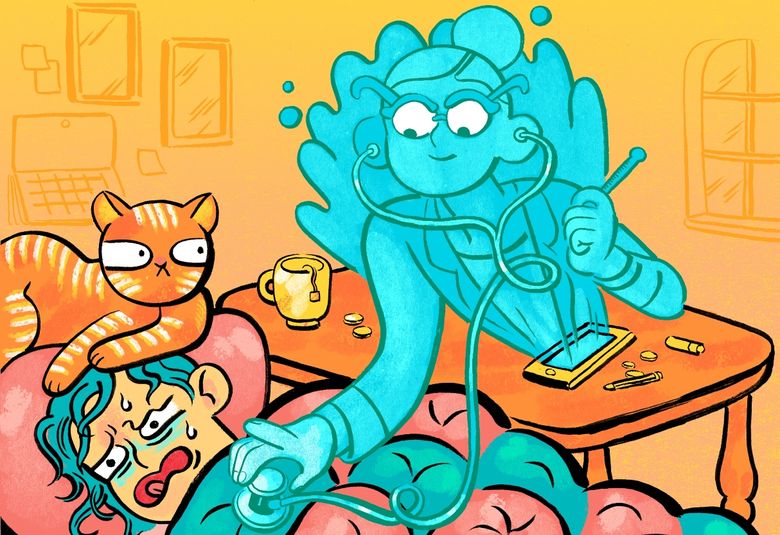
" The Artificially Intelligent Doctor Will Hear You Now "
The current stage of mass interest in neural networks is largely related to the capabilities of image processing grids. Improve the quality of a photo, stylize a selfie for a picture of a famous artist, reveal an object in the frame and launch a cascade of external events - all these illustrative examples are available today in various products: from an application for processing photos to a complex road autopilot system.
There is another important area of application for neural networks and other technologies that are close to AI - this is medicine. If it's not about IBM Watson, then news from the complex world of high-tech struggle for human health rarely leaks to the media. In the meantime, a real revolution is taking place - it turned out that the automated image processing system can not only become a powerful analysis and assistance tool for the doctor, but in some cases, can replace the specialist himself.
And not only neural networks feed the new technological breakthrough. Bigdat, machine learning in general and even blockchain become the basis for medical startups contributing to the fight against disease and aging.
BenevolentAI. Help in the discovery of new drugs
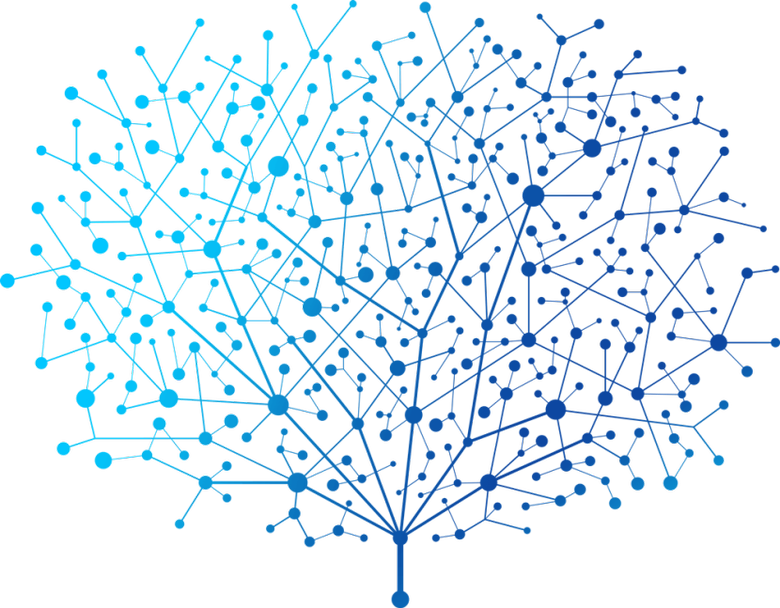
Millions of dollars are spent annually on the development of new methods of treatment, but we have no ready-made result. Perhaps, technology related to AI can help.
The British startup BenevolentAI is developing its own drugs through machine learning, hoping to find those chemical formulas of substances that people do not notice yet. The BenevolentAI technology analyzes academic literature, research, and other data about specific diseases and uses this to help put forward a hypothesis about the prospect of finding a cure.
There is a lot of information in the world now - new research related to medicine is published every 30 seconds. There is not a single person or even a group of people who could study all scientific works even on narrow topics. BenevolentAI states that they can quickly find relationships between various research done by unrelated science laboratories.
By following this approach, BenevolentAI, for example, can identify molecules that have failed in clinical trials and predict how these very compounds can be more effective for treating other diseases.
Unlike other companies in the field of AI, BenevolentAI has not yet published scientific articles about its technology. But according to CB Insights, BenevolentAl is one of five private AI companies valued at more than $ 1 billion. In 2014, the company signed an agreement for $ 747.8 million with an unnamed US pharmaceutical company to search for an effective treatment for Alzheimer's disease. .
Calico Labs. Treatment of aging and other diseases
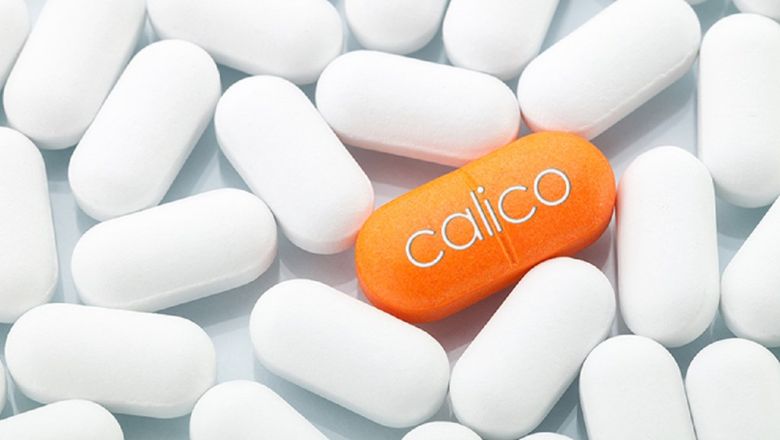
The fight against aging is a trend of our time. Perhaps we are the first generation to start treating aging as a disease?
Calico LLC ("California Life Company") is a biotechnology research and development company founded in 2013 with the goal of combating aging and associated diseases.
In September 2014, it was announced that Calico, in collaboration with AbbVie, would open a research center focused on aging and age-related diseases, such as neurodegeneration and cancer. Initially, each company invests $ 350 million with the ability to raise an additional $ 500 million later. In the same month, Calico reported on collaboration with the Southwestern Medical Center at the University of Texas at Dallas to develop a drug for neurodegenerative disorders.
In 2015, the MIT and Harvard Institutes announced a partnership with Calico to "promote research on age-related diseases and their therapy." A further collaboration was also announced with the Baka Institute for Aging Research (the world's leading institute for the study of human aging).
Calico is an extremely closed company that practically does not publish in the media, does not issue press releases and does not contact with journalists. Scientists collaborating with the laboratory sign a non-disclosure agreement. Around 100 Calico employees focus on basic science.
In a rare interview with Calico’s research director, it says that in the “best case” the company will be able to present the results to the world no earlier than in 10 years. Not everyone agrees to wait so much. Aubrey Dee Gray, one of the most famous gerontologists in the world, considers Calico "the biggest disappointment."
Whether the company is waiting for success or failure - in the coming years we will not know. However, in 2017, they began collaborating with C4 Therapeutics, a private biotechnology company, to develop drugs for diseases such as type 2 diabetes and cancer. Perhaps aging is not yet for us to conquer, but we will be able to cope with many dangerous diseases?
doc.ai Analysis of laboratory results
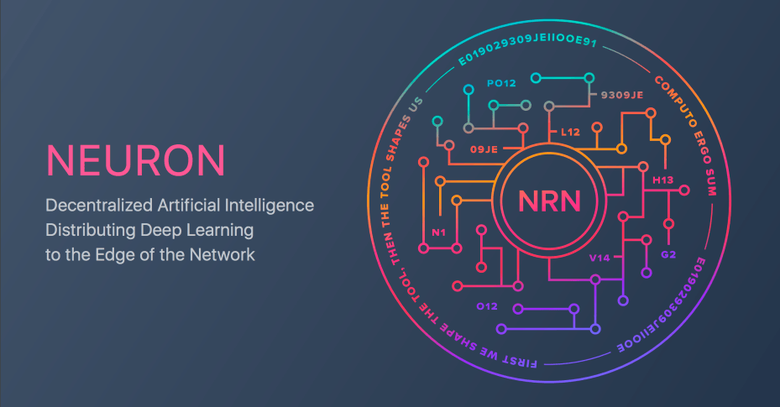
A startup from Russia, which combined the two most popular IT topics: AI technologies and cryptocurrency. doc.ai came out on ICO with NEURON tokens (NRN) and raised approximately $ 10 million. A start-up beta promises to launch a beta application in March – April 2018.
doc.ai plans to determine the physiological state of the patients upon request. The dialogue system will “communicate” with the patient in a natural language, analyze the data: genomic, pharmacogenomic, expomic, anatomical; characteristics obtained from medical sensors, as well as hematology data.
Neuron tokens provide network access and reward users (individuals or research organizations). For tokens, users can arrange contests on the NEURON platform and create incentives (prizes) for specialists in the processing and analysis of medical data.
Open Longevity. Analysis, interpretation of medical data, organization of mass clinical trials with the aim of the final victory over aging
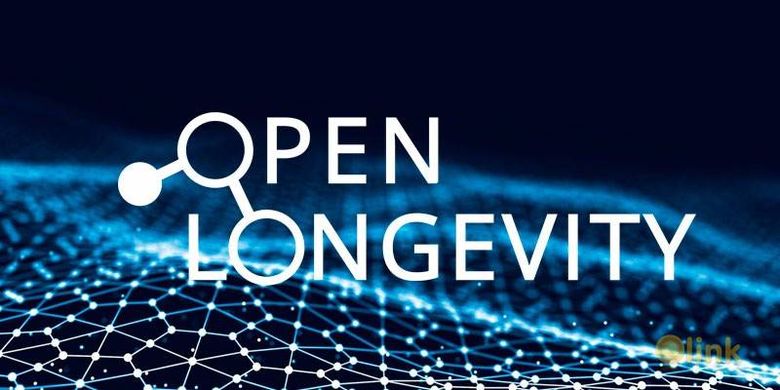
Another blockchain start-up from Russia, a direct competitor doc.ai, who collected only $ 70,000 for Pre-ICO, but showed a real working prototype of a system for diagnosing diseases and interpreting medical research.
In addition to the obvious goal of providing users with comprehensive health information and recommendations for correcting the errors that have accumulated in the body, Open Longevity has an ambitious goal - to begin conducting clinical trials of anti-aging therapy by the patients themselves. Some users attract funds to the project, others (or the investors themselves) will voluntarily take part in strictly controlled medical tests. The startup takes on all legal work related to the need to ensure compliance with stringent international requirements for such studies.
You can try the alpha version of the medical analysis tool here . It is enough to enter into the table several key biomarkers to get recommendations, as well as to see links to scientific publications (registered on the pub book) on the identified problems or these recommendations. The portal already possesses analytics from 70,000 scientific articles.
Joy. Track and improve mental health
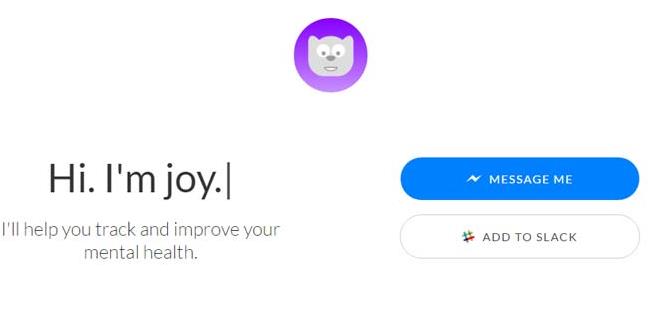
Thanks to technology, we can continuously measure and track virtually all aspects of our lives, including health. Daily we can control weight, number of steps, pulse rate and more. There are countless products and companies that help you burn calories, measure how well you slept the night before, and offer tips to improve your physical condition. However, almost no one is engaged in mental health.
A huge number of people around are experiencing mental problems. And many remain with their problems alone, for years accumulating an exorbitant burden of psychological problems. Chronic depression and anxiety disorders have become the norm, but serious bipolar disorders are increasingly being added to them.
The main problem of the growth of mental problems is ourselves. We do not pay enough attention to our own mental health. As they say, you can not control what you do not measure. Annual medical checks, fitness trackers and more cannot help us cope with mental problems.
Joy checks you once a day and asks you how you are and what you did today. Based on your answers, Joy can interpret your emotions and recognize whether it was a beautiful day, a bad day or something in the middle. Feel anxious? Joy will find out about this and will offer you some tips on how to reduce anxiety.
Joy will generate weekly reports about your mood, based on what you said. The application learns from the experience of communication with the user and in the long term offers various treatment regimens.
Not everyone can agree with Joy’s typical tips, like, "Sometimes the most difficult thing is to let go, but usually it frees you from anger." Of course, the application does not replace the real doctor and should not be used in an emergency, but sometimes a frank conversation with someone, even with the chatbot, is the best medicine.
Tess and others from X2AI. Mental Health Consultants
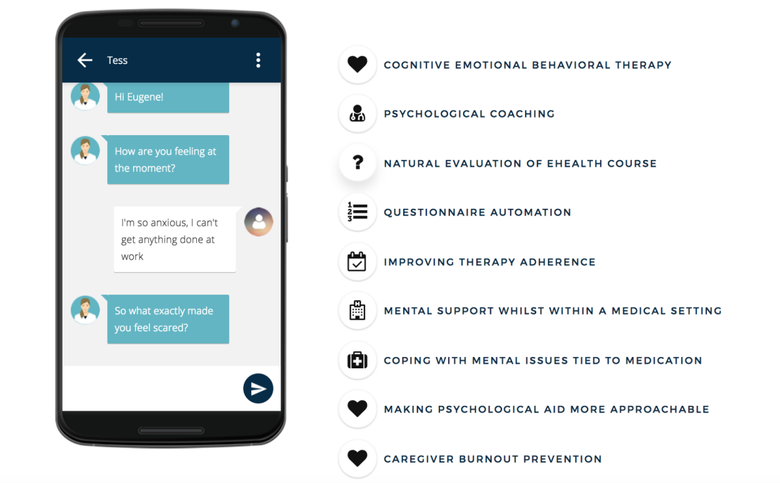
With this chatbot, patients can receive support remotely, at any time, including when their doctor is unavailable. The authors of the application rightly point out that conversations with an ordinary psychotherapist often follow a limited number of patterns and ways, which leaves many opportunities for automation. The X2AI bots detect patterns in the wording of phrases, typing speed, sentence length, grammatical errors, revealing correlations with various emotional states. This allows the system to notice hidden emotions as therapists do.
X2AI provides communication with a “therapist” who adapts to each user with whom he interacts. Tess detects a change in a person’s mood. Thanks to the processing of natural language, the bot will be able to determine whether a person is reaching a dangerous level of depression where expert intervention is already required.
When Tess discovers that the user is indeed in distress, for example, speaks of suicide, he sends a consultation session to a real human psychologist. A special version of Tess was developed, designed to work with war veterans who have pronounced post-traumatic stress disorders.
X2AI provides a range of personalized mental health services, such as psychotherapy, psychological coaching, and even cognitive behavioral therapy. In addition, the startup has developed a special application with chatbot, communicating in Arabic, to help people in refugee camps in the Middle East to cope with depression, a sense of hopelessness and fear of an unknown future.
The X2AI multilingual chatbot family also includes the Nema bot, which specializes in treating diabetic children and “Sarah”, designed to help teens cope with loneliness. Some of the bots are designed to meet the needs of a particular client (X2AI works with several large American and European health care providers), while others seek to meet the needs of crisis areas (the Lebanese Ministry of Health and the UN World Food Program expressed interest in implementing more ambitious pilot programs using psychological chatbot). Other bots are currently being developed to help people affected by the violence in Brazil and Nigeria.
Babylon Consultations of doctors using AI
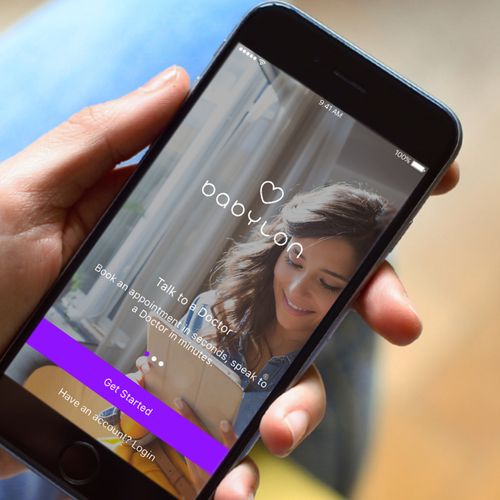
Babylon allows users to conduct unlimited virtual consultations (for a paid subscription) via text and video chat in the application. Babylon also allows users to get prescriptions for medicines, referrals to specialists and pay for medical advice at nearby clinics.
At the end of 2016, the application received $ 25 million investment, and in April 2017 another $ 60 million to develop new opportunities. All this money is needed in order to switch to a full-fledged weak AI, able to accurately identify the disease and choose the most appropriate treatment.
Bitesnap. Counting calories from food photos

It is best not to fight the disease, but to prevent its occurrence. Nutrition is the basis of a healthy lifestyle. Therefore, the free application Bitesnap from the company Bite AI helps those who are trying to follow a certain diet.
Bitesnap uses machine learning to identify food by photo. It is enough to take a picture using the application (or add it from the gallery), and the application will try to determine what is in the picture. Bitesnap will tell you exactly what you eat, including carbohydrates, proteins and fats, and determine how many calories you consume.
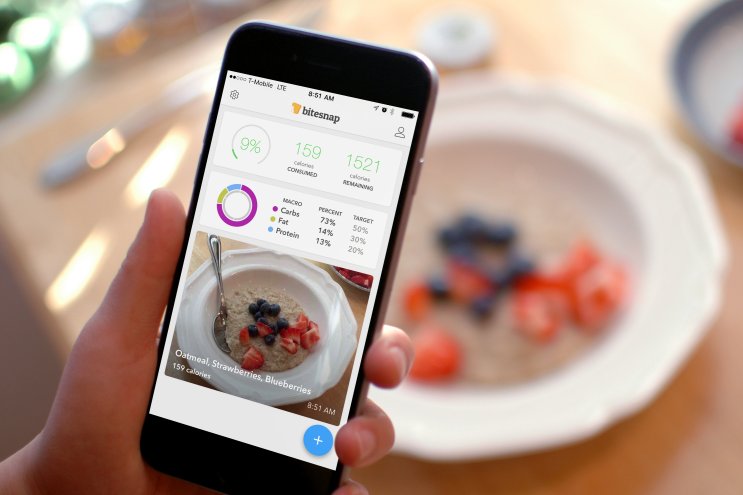
You can set up reminders to eat at a specific time, as well as enter your weight and height to calculate your body mass index. This can help Bitesnap determine what your ideal diet should be.
Cue from Kiwi. Helps quit smoking

The application for smart watches (any), which helps reduce the number of daily cigarettes, and then stop smoking altogether. Cue provides positive reinforcement, rewarding virtual achievements for increasing the time between smoke breaks. The application uses machine learning algorithms to customize the gamification process for each individual user.
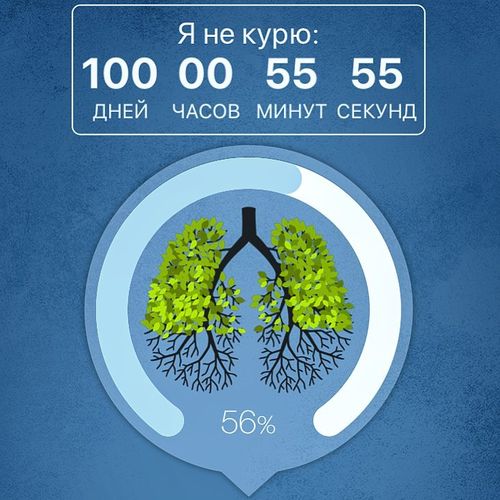
Interestingly, the application has alternatives. In the illustration above - smoking. The program counts the time that the user does not smoke, money saved, health progress (blood circulation, potency, heart, carbon monoxide and nicotine).
CareSkore. Software to predict the course of the disease
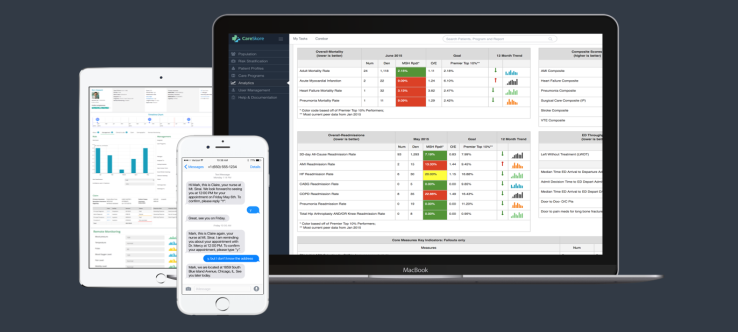
CareSkore uses machine learning to predict the course of the disease and the likelihood of mortality. CareSkore combines clinical, socioeconomic, demographic, and patient behavioral data to create a holistic picture that doctors and insurance companies can use to provide the best preventive care.
CareSkore also helps patients who can use the system to inform doctors about new symptoms or ask questions about their condition. The company plans to use smart sensors so that patients only in extremely rare cases go to the hospital. Sensors in real time will collect all the information about health and transmit to the attending physician. The system will be able on the basis of these sensors to make treatment recommendations.
CUDL. Storage and processing of ultrasound diagnostic data
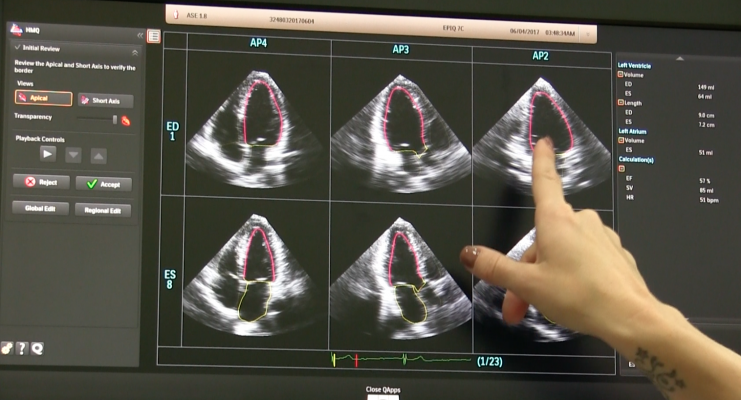
CUDL (Collaborative for Ultrasound Deep Learning) is working to create a cloud service that allows doctors to download 3D ultrasound scans of the human body for further processing. 3D ultrasound is used in almost all modern clinics, but a common database with images and models can bring many additional benefits.
The concept of CUDL is to try to get the most out of ultrasound and make it a more useful method for visualizing diseases. You upload the ultrasound scan data to the system and get the diagnostic results made by the system, which analyzed thousands of other images of the same part of the body or the same area. The CUDL system is constantly learning, figuring out what is considered normal, abnormal, or important in pictures.
The best imaging techniques today are MRI and CT, but this is expensive research. Now ultrasound becomes an affordable and compact method of effective diagnostics. You do not need an advanced 3D scanner in the clinic, you simply use conventional ultrasound machines. The decision support system itself will provide answers based on computer analysis, which scans look normal and which require further study.
Deep 6 Analytics. Helps to find patients for clinical trials faster.
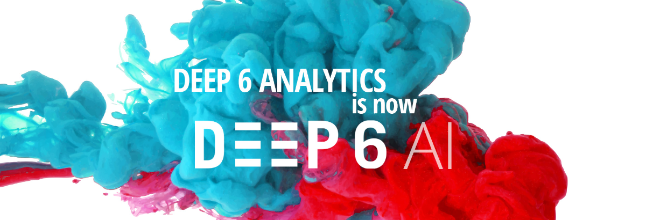
Like Open Longevity, Deep 6 AI (formerly Deep 6 Analytics) should help find patients for clinical research in minutes, not months. Deep 6 AI software significantly reduces the search time for suitable patients by analyzing numerous medical data in natural language. Deep 6 AI turns fragmented medical documents into unified diagrams containing all the information necessary to meet the complex criteria of clinical trials.
Unfortunately, there are very few publications about startups and no data about real projects. But his fate should be closely monitored - a promising topic.
Freenome. Clever diagnosis of cancer and other diseases
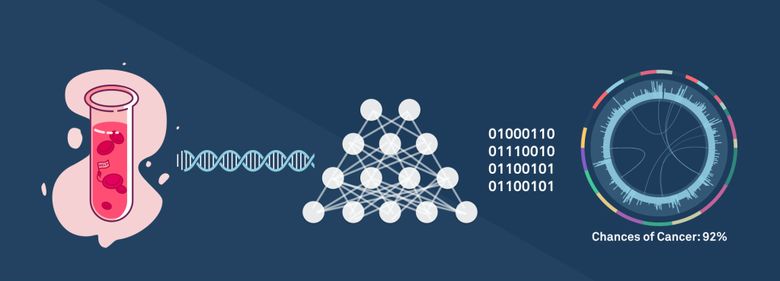
Freenome, a cancer diagnostic platform, has raised over $ 70 million. A large amount of investment is related to the opportunity offered by a startup. A few drops of blood are enough to answer whether the patient has cancer or not, whether there are malignant neoplasms or whether they are benign.
The company checked thousands of blood samples and claims that its tests are the best on the market for four types of cancer: prostate, breast, colorectal, and lung.
Freenome uses machine learning to detect markers of cancer in the blood. The idea is that the computer can detect cancer at the earliest stages - when it can be easily and inexpensively cured by any patient.
Most interestingly, Freenome is just one of many companies that develop blood tests to detect cancer at the earliest stages. Competition in this market in all senses will be beneficial for patients.
Sentrian. Early detection of patient deterioration in chronic diseases
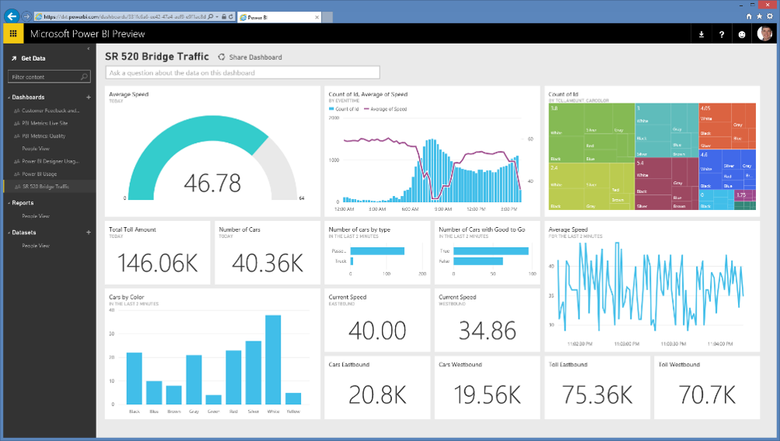
Millions of unnecessary hospitalizations lure tens of billions of dollars a year from patients all over the world. Excess hospitalization could have been avoided if we could detect the deterioration of the patients' health using remote monitoring. The Sentrian platform uses biosensors and machine learning to detect weak signs of impending problems.
Sentrian allows you to avoid false hospitalization (and probably the particular suspiciousness of some patients), and also accurately warn you about the need to seek hospital help even before the onset of the acute stage of exacerbation.
Zymergen. Changes microbes to create new drugs
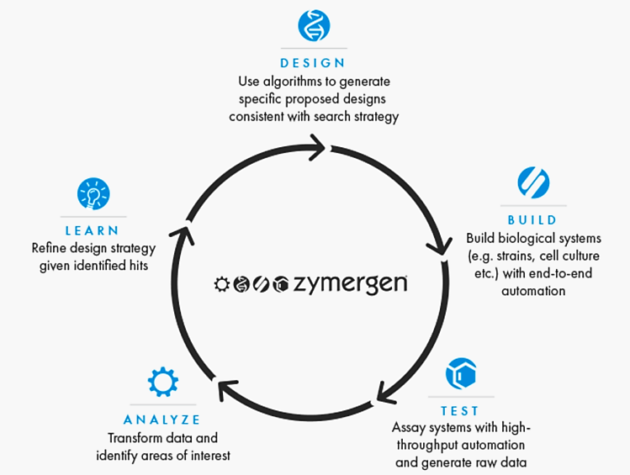
Zymergen releases the drug from genetically modified microbes. With over $ 200 million in investment, Biotech Zymergen uses microorganisms to produce various chemicals or even create new drugs.
Every day we are confronted with products created by microbes. They produce bread, cheese, wine and chocolate. In industry, microbes are used to produce a range of common chemicals. Most penicillin, citric acid and insulin are produced by specialized microbes. The range of application is very wide: fuel, adhesives, pigments, drugs and more.
How do we figure out which part of the DNA needs to be inserted into the microorganism, and how will we understand that the process went right? As soon as we have the first “correct” bacterium, can we make other changes to its DNA that would force it to produce the substances we need more and faster? Historically, it was a very laborious process, consisting of trial and error.
Zymergen dramatically accelerates the process of creating and improving specialized strains. The company uses machine learning to conduct more tests, to make fewer mistakes, to achieve success in the end, spending less human resources. The software can automate part of the process, so the company's employees for the most part are not even biologists, but specialists in the field of applied statistics, machine learning, biostatistics, astrophysics and a number of other areas. As a rule, these are people who have extensive experience in applying numerical analysis methods for complex data sets.
In addition, the company actively uses robots. And this is not nanobots, as you might think, collecting bacteria from ready-made blocks. For example, Robothead Echo automates part of the work with bacterial strains, allowing you to do up to 1000 experiments a week - before this could not be done even by a whole team of people.
Zymergen is confident that robotics and machine learning will make it possible to create new drugs faster and cheaper.
We mentioned only a tiny part of the projects - for example, neural networks were left behind the frame, helping to detect lung cancer by X-rays. But look around you - almost every aspect of IT technology can now be found at the outpost of medicine. From methods of analyzing behavioral graphs in the social network to the mechanisms of recommendations, machine translation, computer vision.
Modern biotech is first of all information technologies that solve a variety of tasks. Now there are a lot of companies here, a lot of investments and so far few really working services. Let's hope that a critical mass will be achieved in medicine and the quantity will turn into quality.
')
Source: https://habr.com/ru/post/371041/
All Articles